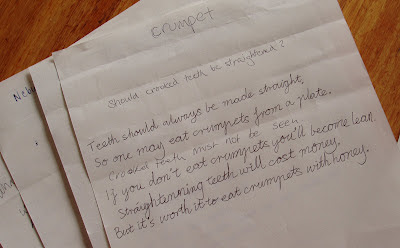As we played, we concentrated, argued, postured, threw out false lures, groaned, and laughed ourselves silly. It was a memorable night, something that will be repeated well before my next birthday.
I thought about that night as I watched Andrew Denton’s new show, Randling. Randling is a tournament of parlour games played by intelligent and funny people. I’m sure I’m supposed to love the show, but I felt it missed something. As I watched, I began to realise that parlour games are not about the games themselves. Instead, they are about participation. Watching other people play on the telly taught me nothing about my friends, nothing about myself. It didn’t connect me with anyone; it gave me no joint memories; it kept my mask intact.
Playing parlour games, as opposed to watching them, is a different story. Every person in the room puts themself on the line at some stage or another, and the rest of us get to learn that this person is a bluffer, is witty, is a natural poet.
Games open us up to each other, revealing glimpses of ourselves that we often keep under wraps. To play well, we must relinquish our dignity and enter into the world of make believe; playing can be scary, confronting – and very very funny.
At my games night, many of us there recalled another night we had played ten years earlier; we remembered the Dictionary words, and the cunning strategy of one particular friend. We were reminded that our lives have been linked together for more than a decade, and even although most of us have had children, moved suburbs and become hyper busy, we can still get together from time to time to share drinks, games and old jokes, picking up where we left off. No tv show comes close to this.
So the next time you’re thinking of watching Randling or anything else, I invite you to put down the remote and take a good look around. Is there someone in the house who’s up for a spot of scrabble, gin rummy or fan tan? Could a friend pop over for an hour once the kids are in bed and share a cuppa and a round of backgammon? Could you pull out a jigsaw in solitude and enjoy the meditative click as each piece falls into place?
It really doesn’t matter if you’re any good at games. What matters is that you’re willing to play, because if you really throw yourself into the game you might just find yourself experiencing fullness of life, that sacred state of being in which you are no longer audience member or consumer, a passive person to whom things happen. Instead, for a few precious minutes, you are deeply alive, a fully creative participant.



So true. This gave me flashbacks to good old Norm from the 'Life Be in It' era. Thank you so much for this wonderful reminder that life is all about participation.
ReplyDeleteOh I'd forgotten about Norm! 'Life Be In It' was all about participation, wasn't it? Something we're even less likely to do with the modern obsession with massive entertainment units.
ReplyDelete